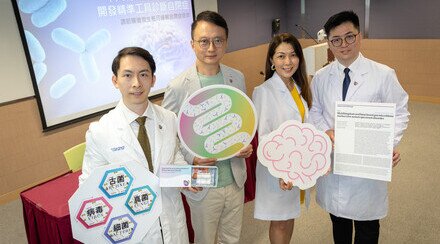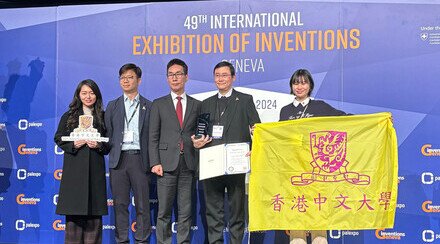CUHK Develops Resource Kit to Enhance Social Skills Among Autistic Students To be Promoted to All Local Schools
The Department of Otorhinolaryngology, Head and Neck Surgery and the Institute of Human Communicative Research of The Chinese University of Hong Kong (CUHK) has jointly formed a ‘Hong Kong Social Thinking Research Team’ with the Rehabilitation Service of Caritas (Caritas) and the Education Bureau to develop a training approach and a resource kit that can effectively enhance the communication skills of students with Autism Spectrum Disorder (ASD). The team is going to promote the approach to local mainstream secondary schools.
According to the records of the Education Bureau, over 6,000 students of subsidized schools in Hong Kong suffer from Autism Spectrum Disorders (ASD). As defined by the American Psychiatric Association, ASD is a complex developmental disability that appears during the first three years of life as a result of a neurological disorder affecting brain function. Since ASD students have social communication difficulties and are prone to emotional disturbances, they may have more conflicts with their classmates or teachers. They often become targets of teasing, rejection or bullying in school and fail to establish normal peer relationships.

(From left) Ms. Peggy Pui Kei Kan, Research Assistant; Professor Kathy Yuet Sheung Lee, Associate Professor; Professor Michael Chi Fai Tong, Department of Otorhinolaryngology , Head and Neck Surgery of CUHK and Ms. Yuen Mai Mark, Project Officer of Caritas Rehabilitation Services jointly present newly developed resource kit for local schools autistic students
To enhance the social skills of ASD students, the research team has introduced the ‘Social Thinking Training’ in local schools. The training approach prompts students to ‘think about’ the details in daily social activities and the reasons behind every social interaction (verbal or non-verbal). It is proven to be effective in improving the social and communication skills among ASD individuals.
In 2008, the research team introduced the ‘Social Thinking Training’ programme to 44 ASD students in 14 secondary schools. A pool of concise phrases, namely ‘Social Thinking Critical Vocabularies’ were used by various related parties as standard verbal cues to remind the students on corresponding important behaviours. A rating scale was used to assess the social behaviour appropriateness of the students before and after training. There was a 12.8% increase in their average score, which was statistically significant at the p<0.001 level. Significant improvement was observed in the areas of initiating interaction, perspective taking and active listening. In 2012, the research team further engaged 10 frontline staff of secondary schools to conduct the training on 35 students who showed an 7.2% increase in the average score at the p<0.001 level.
With the support of the Knowledge Transfer Fund of CUHK and the Quality Education Fund, the research team has developed a training programme with resource kit that is specific to local language and culture. It is designed for secondary students with social communication deficits (e.g. ASD, ADHD) in local mainstream schools. Prof. Michael Tong, Professor, Department of Otorhinolaryngology, Head and Neck Surgery, and Associate Director & Chief Operating Officer, Institute of Human Communicative Research, CUHK, said, ‘The kit illustrates daily scenarios with colourful comics and explains in details the use of “Social Thinking Vocabularies” with suggested activities for teachers, social workers and counsellors to better understand the needs and difficulties faced by the students. A Social Thinking Vocabulary Booklet is included as a visual teaching aid.’

(From left) Research group members demonstrate the resource kit.
A training seminar on ‘Social Thinking Training’ was held in June that was well-attended by representatives of 154 schools and over 100 NGOs and related government organizations. Participants learned how to use the resource kit and took part in activity demonstrations during the seminar. Due to overwhelming responses, another session of the seminar will be held on 16 October 2013. Interested parties may visit here for details: http://socialthinkinghk.com. The resource kit will also be distributed to all mainstream local secondary schools via the Education Bureau.
For media enquiries, please contact Ms To, Department of Otorhinolaryngology, Head and Neck Surgery, CUHK (Tel: 3943-9609) or Ms Mak, Caritas Rehabilitation Services (Tel: 2117- 3487/3488)























